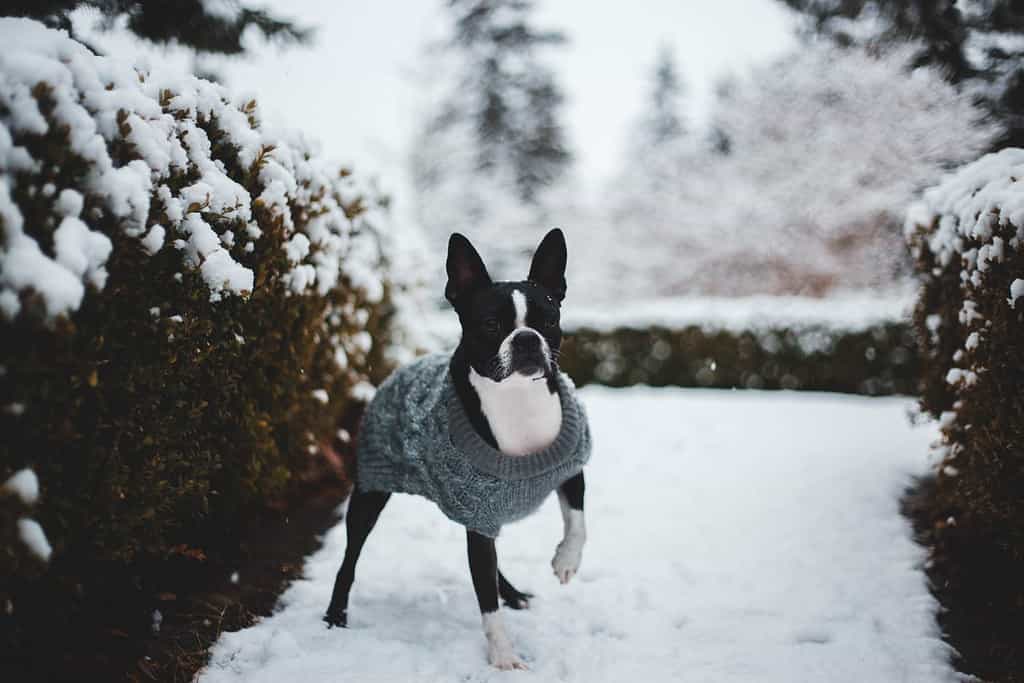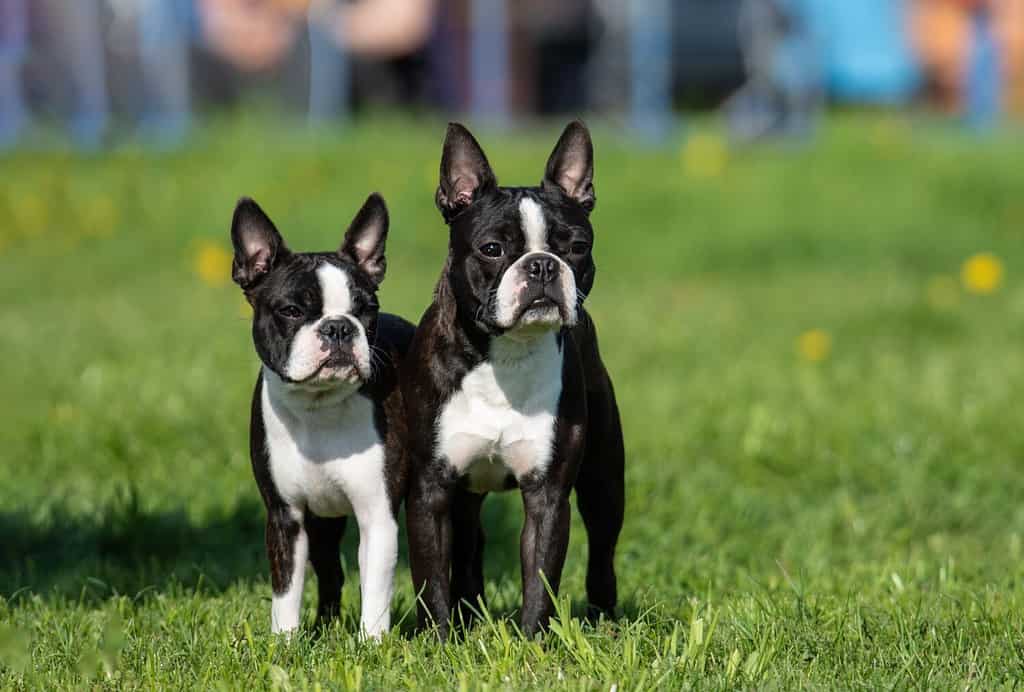Boston terriers are sweet and outgoing pups. Their easy-going nature makes training a bit easier. After all, they are known as American gentlemen for their looks and personality. Let’s take a deeper look now at the recommended cues, training timelines, and further information on the best ways to engage in training your Boston Terrier.
One precaution that needs to be considered is their brachycephalic condition. Due to their short snouts, breathing can be harder on these sweet pups. Training is best done in an indoor area that is climate-monitored. If you live in a hot environment, it can cause breathing issues. For this reason, using a halter instead of a collar is also recommended to protect their delicate windpipes.

Boston terriers are sweet and outgoing pups.
©Introspective Design/Shutterstock.com
Understanding Boston Terrier Training
When training a Boston Terrier, consistency is a key factor. In addition, these sweet pups are sensitive souls, which means delicate training methods are required for success. A combination of correction and positive encouragement is strongly suggested to keep your Boston Terrier attentive during training. Your pup is willing to do anything to make you happy, so you’ll be pleasantly surprised by how quickly they may pick up training. They do not do well with aggressive training methods, nor is it necessary.
The Best Training For Boston Terriers
As mentioned above, positive reinforcement is the best training method for Boston terriers. These pups are sweet souls who do not handle negative criticism or abrasive training methods. It should also be noted that giving them a treat with verbal praise is an ideal method for training. Whether you are training a puppy or an adult, these methods will allow them to associate positive things with training. This will make it a happier experience for you and your pup.

©iStock.com/Karetyna Varhanova
Boston Terrier Training Timelines & Recommended Cues
Different dog breeds require training to start at different ages. For example, Boston terriers do best with training that begins at eight weeks of age. In this section, we’ll examine which cues should be taught first.
8 to 16 Weeks
Socialization
For Boston Terriers, their socialization period typically lasts eight weeks. It begins usually around the 8-week mark and goes to the 16-week mark. During this time, you should gradually expose them to noises, people, and environments where they can experience diverse sounds, smells, and things.
Basic Commands
Due to their sociable disposition, Boston terriers should learn basic commands such as “sit”, “stay”, “down”, and “come”. Teaching them these commands early on helps them establish healthy boundaries and respect when meeting other people and dogs.
Crate Training
In addition to training your Boston Terrier socialization, crate training should begin as soon as potty training so that they learn to be okay with being alone. The recommended crate size for Boston terriers is 24 X 30 inches. Making their crate as cozy as possible would be best to create a sense of security. Adding a few blankets, toys, and a fluffy bed will help you accomplish this.
House Training
House training is crucial to teach your Boston terrier the second you bring them home. Remember to stay consistent by taking your puppy simultaneously every day.
10 Training Tips For Your Boston Terrier
To help training run smoothly, below are 15 tips to help you have the best training experiences for you and your pup.
1. Consistency Matters
It may be repeated throughout this blog article. However, it helps your dog understand what you are trying to teach them.
2. Keep Training Sessions Short
Boston Terriers do not have a long attention span. At the same time, you will want to only focus on two commands per training session. Overdoing training can result in losing your dog’s interest, making maintaining a productive training schedule harder.
3. Make Training a Daily Habit
A common mistake most people make is not making training a daily habit. As a result, it makes it difficult for your dog to understand what you are trying to teach them.
4. Don’t Yell
Training a Boston terrier can be frustrating. However, yelling or lashing out when they refuse to listen will not result in positivity. If training your dog seems to be going nowhere, take a break and come back when you are calm.
5. Start with the Basics
It may be tempting to start training your Boston terrier to do cool tricks. But, it is better to start with simple commands and work your way up to the neater tricks.
6. Be Clear When Giving Commands
Clear communication is significant for training Boston terriers. When giving commands, ensure you only use one word instead of two. This helps make the command clever, allowing your Boston terrier to understand you better.
7. Understanding is a Must
When it comes to training, keeping your dog’s attention is one thing. On the other hand, getting upset with your dog and becoming angry at him when he makes a mistake will not help you train them. When you find yourself getting angry because of the mistakes they make, it is best to walk away for a while until you are calm. Your dog can sense your energy; if they feel you are mad, they will also become angry or frustrated.
8. Change Up Training Settings
Training in the same environment day after day can get dull for your dog. Not to mention, it can make training way too easy. By changing the environment, you’ll help ensure that your dog listens to you regardless of their environment.
9. Make Training Fun
Make training enjoyable for you both. Doing so will keep your dog’s attention while keeping them at ease. Keep training interesting by playing games and using their favorite toy as a positive reward.
10. Set Achievable Goals
It is crucial to remember to set goals that your Boston terrier can achieve. Do not expect your puppy to learn everything in one day. Training takes time, consistency, and effort from both parties.
3 Common Mistakes When Training Boston Terriers
There are a few common mistakes that can happen when training Boston terries. Below are three examples with tips on how to avoid them.
1. Not Socializing Your Boston Terrier Properly
Socializing is an essential part of your dog’s training routine. Failure to properly socialize them can lead to behavioral issues such as aggression down the line. Emphasizing socializing them in the 8-16 week period of their life will help reduce chances of behavioral issues in the future. Also, be sure to take them to different areas to socialize, such as car rides, dog parks, and people’s houses, to introduce them to new stimuli.
2. Lack of Exercise
Exercise is an important necessity in your Boston terrier’s life. It can help training sessions run better and also help prevent heart disease and obesity. Taking your dog for daily walks and playtime will help prevent dogs from becoming lazy. Exercise can also help your Boston terrier pay attention during training. Typically, adults will require 50 minutes of exercise daily, while puppies will need 5 minutes each month they age. For instance, a 6-month-old puppy will need 30 minutes of daily exercise.
3. Not Teaching Them Food Manners
Never feed your dog human food; it can cause them to ditch their food to eat more of yours. This training mistake can be avoided by providing high-quality dog food as directed by your local vet.

Exercise is an important necessity in your Boston terrier’s life.
©natali.lymarenko/Shutterstock.com
In conclusion, training a Boston terrier can be easy-going, fun, and a great exercise for owners and dogs. Stay consistent with your training, be patient, and don’t forget to enjoy your training times together.
The photo featured at the top of this post is © Kellymmiller73/Shutterstock.com
Ready to discover the top 10 cutest dog breeds in the entire world?
How about the fastest dogs, the largest dogs and those that are -- quite frankly -- just the kindest dogs on the planet? Each day, AZ Animals sends out lists just like this to our thousands of email subscribers. And the best part? It's FREE. Join today by entering your email below.
Thank you for reading! Have some feedback for us? Contact the AZ Animals editorial team.






